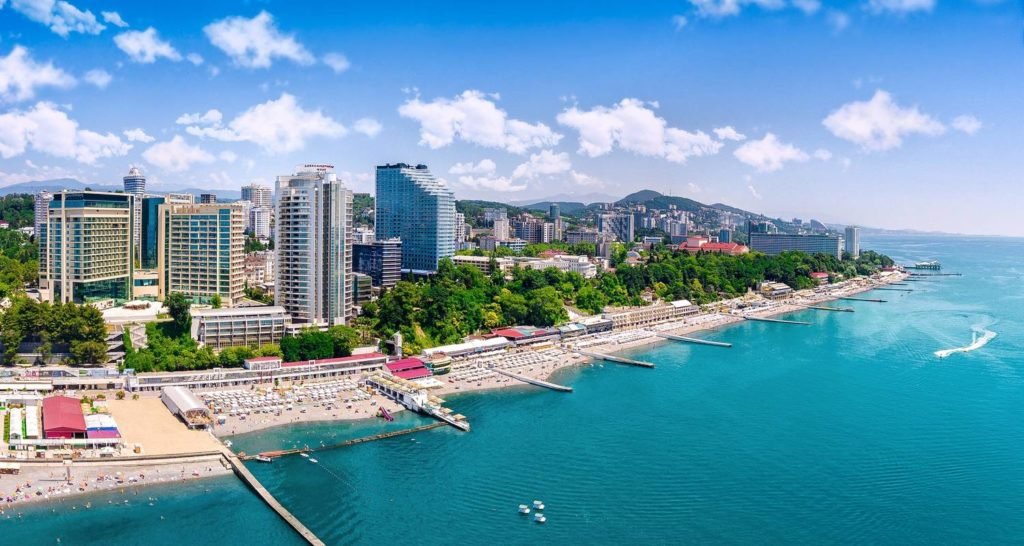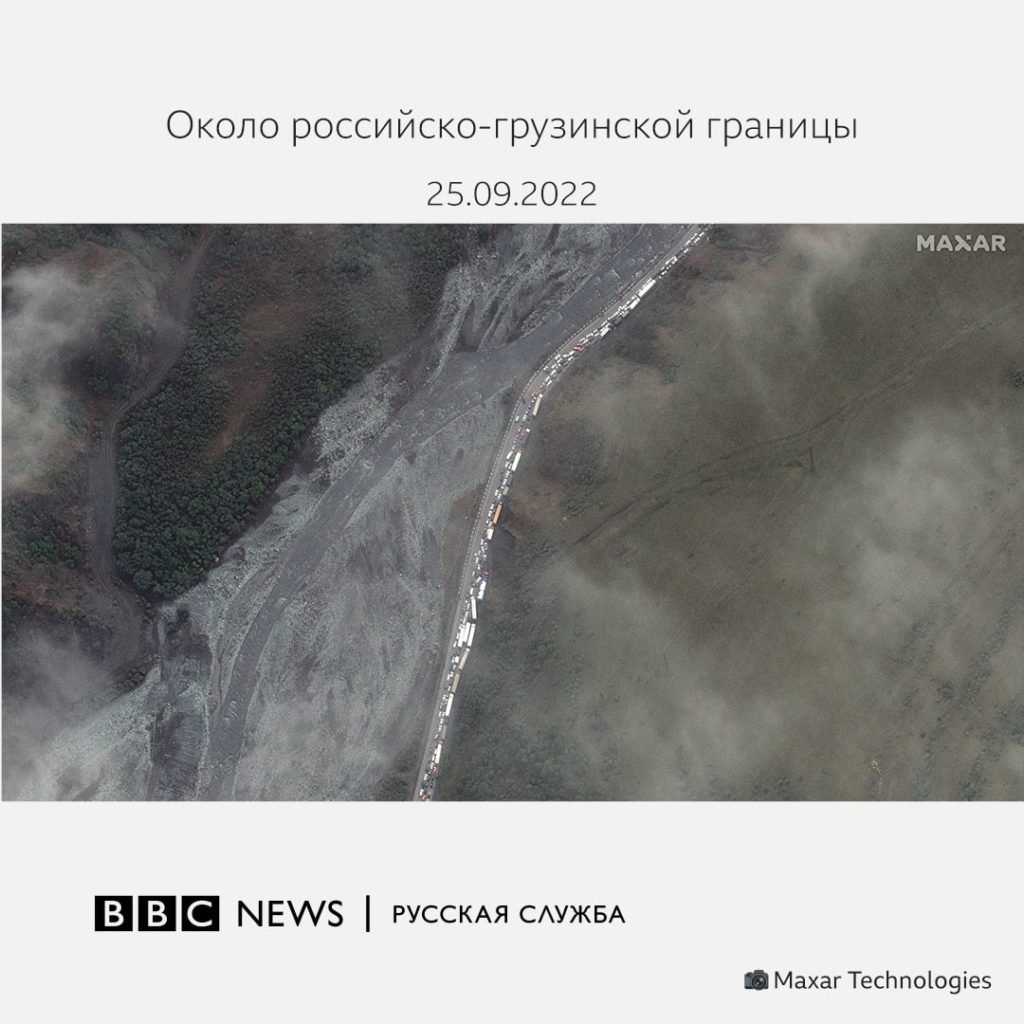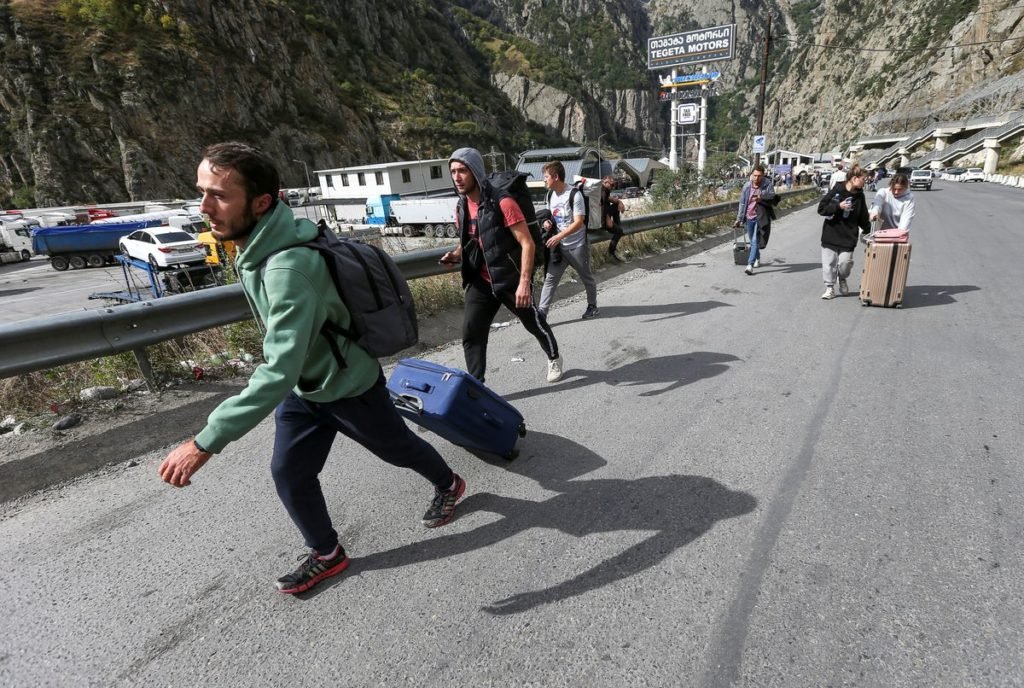On September 22nd, against the backdrop of the Ukrainian army’s offensive, President of the Russian Federation, Vladimir Putin, announced “partial” mobilization, drafting men with “military experience” to the war with Ukraine. Not only has this escalated the conflict and decreased his rating, but it has also motivated thousands of Russians to flee the country. Men at risk of joining the Russian army, their families, and other citizens fearing an even worse upsurge leave their homes and jobs in search to discover a more peaceful place to live. Such people found shelters in the closest countries like Qazaqstan, Georgia, Armenia, and Mongolia. Overall, it is counted to be around 700,00 citizens leaving Russia in a two-week period. However, the Kremlin denies this statistic. With such a refugee boom, many Russians struggled with leaving the country. The harshest situation happened on the Russian-Georgian border, where 3,000 vehicles got stuck in terrible congestion. This article will uncover a story of a guy who managed to get through this traffic and flee dictatorship.
The invasion of Ukraine, as well as the announcement of mobilization, caught 25-year-old Maxim in Sochi, a city in southern Russia 2 hours from Moscow by plane. Sochi is in the subtropical climate zone and is famous for its mountains. These conditions make it attractive for Russians to move there. Maxim moved there initially because of an opportunity to work remotely due to COVID-19. After, because of the war, the company has frozen its activity in Russia but continues to pay salaries to its employees. But as in any other city or settlement in Russia, people in Sochi were shocked and frightened on February 24th. Many scared Russians from the South started packing their stuff in panic and leaving Russia, as Sochi airport is left as the only opened civil aerodrome among all the southern ones. Maxim did not feel the need to fly off the handle, especially considering the currency crisis in Russia. In March, the Russian Ruble collapsed, peaking at 132 Rubles for one Euro. “Finances were the main reason,” he says. This is a very common situation for Russians. In fact, only more privileged citizens can afford to move out of the country: it is usually those with a financial airbag, which is 33% of the population.

Despite staying in a country whose State is bombing neighbors, Maxim stayed loyal to his anti-Putin views. Unlike many other Russians, he kept being aware of the news from the war front and continued consuming information from opposition sources. “I cannot fallout from the information field,” admits Maxim. I, personally, can confirm that it is quite a unique case. As I wrote previously, the majority of Russians could not continue reading the news regularly and mentally keep up with such a giant flow of information. So, Maxim is one of a kind.
However, with the new wave of escalation of the war, it became much harder to stay in Russia, knowing that the conflict can concern one directly. Although Maxim does not fit into “partial” mobilization requirements, it is dangerous to stay in Russia, waiting for the Kremlin to announce a full-scale draft for all males. For him, the start of mobilization was not too shocking, as“there is really not much that can surprise after February 24.” Moreover, 7 months of being there and
“hearing Lavrov’s [Russian Minister of Foreign Affairs] and Medvedev’s [former Russian president] cosmic level insanity”
got Maxim psychologically exhausted. That is why he decided to leave Russia, not knowing if it is “for some time or forever.”
Since Maxim had spent his vacation in Georgia at the beginning of September, he chose this Caucasian country as his shelter. Kind people, heavenly cuisine, and relatively cheap living left our hero with no doubts. But there is no gain without pain. As many Russians love Georgia, the next day after the start of mobilization, all of them queued up on the border. This resulted in 3000 vehicles in a line at the Verkhny Lars checkpoint between Russia and Georgia. Maxim and his friend left Sochi, knowing that the time spent on the border was getting longer and longer. But this did not stop them, so they joined the traffic on September 25th.

The first thing that they noticed is the unbelievable scale of corruption of the local Caucasian police. Even on their way to Verkhny Lars, Maxim and his friends were demanded money just to get through multiple checkpoints in Russian Caucasian republics. “I think the bribery got so intense, that people earned money for new houses and cars just in a couple of days,” assumes Maxim. There is not much surprise, because Caucasian republics in Russia are the most corrupt ones (there is supposed to be a link to official statistics, but people in Southern regions of Russia use a lot of cash, which makes it hard to evaluate corruption). Although the majority of people in the traffic got food and water supplies for some days, there occurred an issue with the lack of petrol. The nearest to the checkpoint petrol station is hours away on foot. That is why certain enterprising locals remembered a famous propagandistic motto “we don’t ditch our people,” as Maxim says sarcastically, and offered to buy oil for 1K Rubles per liter, while a normal price for it is 50 Rubles. Another example of terrifying human nature and its desire to profit is how local police offered to move forward 800m in line for 50K Rubles. Considering that the average speed in the traffic was 100m a day, this was a huge privilege. When it was Maxim’s and his friend’s 70th or 80th hour in the congestion, they accepted the offer but found themselves in almost the same situation with two days in traffic ahead of them. “Unstoppable news and rumors about the situation created a feeling of hopelessness and being trapped,” remembers Maxim. At this point, he felt desperate and was thinking of coming back home, but then, “the reason prevailed” and they continued their days-long trip.
The whole trip and the situation on the border “felt like an apocalypse is [was] coming,” admits Maxim. When he saw people trying to cross the border on foot,
“It seemed like I was on the Syrian border where citizens are desperately running from the terrorists,”
compares Maxim. Thousands were standing for days under the harsh mountain climate, barely sleeping. Indeed, photos of Russians on foot, kick scooters, and bicycles spread all over the world.

Commenting on the situation at the border, Maxim says, “One of the worst things about the traffic was anti-sanitary conditions around it.” As the road to the checkpoint is located between mountains, there are no lavatories and no bathrooms. All that those adults, their children, and even pets in 3000 vehicles had were bushes. So, the environment around the road stunk off the biological waste. “I will feel the smell in my nightmares for a long time,” says scared Maxim. What was also hard for Maxim was having to wake his friend up to drive for 2 every meter. In case a car does not move this bit, another one will start to squeeze in.“I felt like Harry Potter that had to feed Dumbledore a potion in the 6th part of the movie,” jokes Maxim referring to his obligation to arouse his driver-friend.
Another aspect of the trip that our hero looks back at is his neighbors in line. He recalls a woman from Saint Petersburg who also decided to flee Russia. Her husband and she had to leave their house building, jobs, and everything else for complete unknowingness. Such a sad story really touched Maxim,
“It is one thing to move at 25 years old, but to go through such a drastic change while being 40 years old is a whole different thing.”
I can definitely relate to his empathy. While it was quite easy to move from Russia to Spain, now, for my parents it seems almost impossible. Property and jobs are anchors that are holding those who are even mentally ready to move out.
So, after spending four days on the border, Maxim and his friend finally managed to step on the Georgian ground, where they are not at risk of being sent to death. “I felt free from hell, especially going 50km/hour instead of 1m/hour,” recalls Maxime happily. Nowadays, guys are living in a Georgian coastal town, settling down in a new place. “1 day here feels as emotionally and psychologically relieving as a 10-day holiday,” utters our hero. He spends his days learning languages including Georgian, reading news, watching political analyses, and exploring his new, temporary, or long-time, home. The only issue that he, as well as many other Russians, faced is withdrawing cash from Russian bank cards. Eventually, he found a way to get cash, but only to keep it in bills, as it is extremely hard for Russians to open a bank account. This situation is extremely relatable to me. Here, in Spain, all my attempts to become a client in different banks finished right at the entrance, when employees saw my nationality written on the residence card. Of course, neither for Maxim nor for me, such treatment of people does not make any legal sense, especially considering that I am just a student whose parents send money to from Russia. Still, this is a minor issue, since we are allowed to stay safe abroad, where Putin’s war is unlikely to reach us. “These are the circumstances that we have to accept,” says Maxim with obedience.
What else could possibly concern Maxim in Georgia is treatment by locals. The media wrote about a few cases of Georgians’ exceptional dealing with Russians. And they have their own very strong reasons. Russia occupied 20% of Georgia in 2008 and still controls this territory, Abkhazia. Considering that the majority of Georgians have or had relatives in Abkhazia, it is not a surprise that Georgians and Russians have beef. For instance, a 2nd year Georgian IE Law student has strong views about the invasion of Georgia by Russians. She makes it clear that,
“If they [Russians] support their government, they are not welcome here.”
Of course, it can be hard for her to interact with Russians, but she admits, “the people that do not [support the government], they are met with open arms,” explains the student, “The whole acceptance of Russian people is based on Georgian tolerance and hospitality.” That is why Maxim has never experienced anything more than disapproving glances. “They left the politics behind and prioritized the economic situation,” explains Maxim. According to him, as the tourist season has finished, locals are taking only benefits from Russians and their money. Farmers, who are, by the way, eager to speak Russian, can continue selling fruit and vegetables while landlords keep getting new tenants. So, as long as Russians have their savings, they are contributing to the local business. Who knows what happens, when Russians have to find a job for themselves…
In the end, Maxim is incredibly delighted to stay in Georgia right now. “If I had an opportunity to go back to the past, considering where I am now, I would still go through this hell just to be here,” admits Maxim. For him, the feeling of freedom is worth it. Today, he is not having any homesickness except worries about his mother who is still in Russia. If Putin starts full-scale mobilization, she can technically be drafted as a military doctor because of her medical major. “In this case, I will have to go back to Russia and do everything to go instead of her,” utters Maxim with a trembling voice,
“Though, I do not understand how I am supposed to see a Ukrainian as my enemy, when all he does is protect his Motherland and its sovereignty.”
Such a scenario seems a little imaginative nowadays. But as Putin has restarted bombing the whole territory of Ukraine recently, the conflict is becoming less and less predictable.
Featured cover image: Andrei, along with his wife Anna and two daughters, on Monday after crossing the border into Georgia. FRANCISCO PEREGIL PECELLÍN. El Pais.






